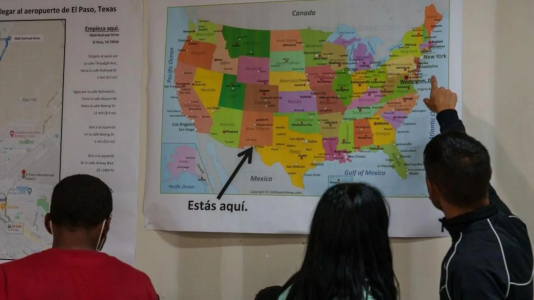
Trump revoking protections for 530,000 Cubans, Haitians and other migrants
Cubans, Haitians, Nicaraguans and Venezuelans who entered the US under a Biden-era programme face deportation.

Migrants from Venezuela viewing a map of the US at a Welcome Center in El Paso, Texas in 2022
US President Donald Trump's administration has said it will revoke the temporary legal status of more than half a million migrants from Cuba, Haiti, Nicaragua and Venezuela.
Those migrants have been warned to leave the country before their permits and deportation shield are cancelled on 24 April, according to a notice posted by the federal government.
The 530,000 migrants were brought into the US under a Biden-era sponsorship process known as CHNV that was designed to open legal migration pathways. Trump suspended the programme once he took office.
It is unclear how many of these migrants have been able to secure another status in the interim that would allow them to stay in the US legally.
The programme was launched under Democratic President Joe Biden in 2022, first covering Venezuelans before it was expanded to other countries.
It allowed the migrants and their immediate family members to fly into the US if they had American sponsors and remain for two years under a temporary immigration status known as parole.
The Biden administration had argued that CHNV would help curb illegal crossings at the southern US border and allow for better vetting of those entering the country.
The Department of Homeland Security on Friday rebuked the prior administration and said the programme had failed in its goals.
The agency's statement said Biden officials had "granted them [migrants] opportunities to compete for American jobs and undercut American workers; forced career civil servants to promote the programs even when fraud was identified; and then blamed Republicans in Congress for the chaos that ensued and the crime that followed".
However, the 35-page notice in the Federal Register said some of those in the US under CHNV might be allowed to remain on a "case-by-case basis".
Karen Tumlin, founder of the Justice Action Center in California, said her organisation is set to challenge the move in court.
She told the BBC the decision hurt people "who did everything right that the US Government asked of them", adding that "their sponsors in the United States paid the fees, filled out the government paperwork, waited in line".
"To say 'oh, we're so sorry, even if you had 18 months left on your grant of permission to be here we're going to pull the rug out from under you in the next 30 days,' it's really quite surprising."
Trump is also considering whether to cancel the temporary legal status of some 240,000 Ukrainians who fled to the US during the conflict with Russia.
CHNV helped a reported 213,000 Haitians enter the US amid deteriorating conditions in the Caribbean country.
More than 120,700 Venezuelans, 110,900 Cubans and over 93,000 Nicaraguans were also allowed into the US under the programme before Trump shut it down.
Last month, DHS announced it would in August end another immigration designation, temporary protected status (TPS), for 500,000 Haitians living in the US.
TPS was granted to nationals of designated countries facing unsafe conditions, such as armed conflict or environmental disasters.
DHS also halted TPS for Venezuelans in the US, although this is facing a legal challenge.
Since taking office in January, Trump's immigration policies have encountered a number of legal hurdles.


